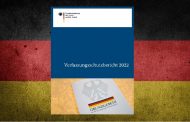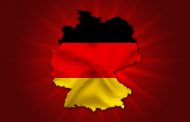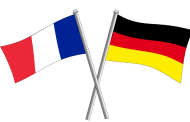Statement by Foreign Minister Heiko Maas “Defending the liberal democracy in the 21st century” in Toronto
14.08.2019
____________________________________________________________________________________________________________________________________
Thank you very much for the kind introduction and for inviting me to speak to you today.
Thanks to the jetlag, getting up early was easy for me. But I do appreciate that all of you made the effort to join us at this early hour.
I would also thank you on behalf of my two teenage sons.
When they heard that I was going to Toronto, they got really excited. Not that they know a lot about the city. But they know the Raptors. And they are probably hoping that I will bring some Raptors souvenirs home for them.
Chrystia knows that I am more into cycling myself. In fact, we even went on a short bike ride through Toronto yesterday.
But I can see why so many people around the world are Raptors fans. Someone has called them “the most unlikely champion in NBA history”.
There were teams with more Money. Teams with a dozen international superstars.
And yet, the Raptors won. They won, because they knew how to pass a ball.
They won as a team. It’s not about “My superstar first”. It’s more about “Make the team great again”.
Ladies and Gentlemen,
You probably didn’t get up at 6 AM today to listen to me talking about sports.
But one thing holds true for both basketball and international affairs: Team play matters. Particularly for countries like Canada and Germany.
We are no global superpowers.
And as Chrystia told the German ambassadors last year: In a world, where might makes right, we can only lose.
Our economies depend on fair trade and open markets. And our societies are built on openness.
But our open societies, our free economies, global order itself are under threat from two sides: from nationalists within our countries and from populists abroad.
Hence, the ballgame called international politics has clearly become tougher.
First, new players have joined it. China with its global ambitions, which are often not in line with our idea of a liberal world order, is just one example.
Global power is shifting. And the digital revolution will speed up this shift.
Secondly, some players are breaking the rules, violating the international order. Think of Russia’s illegal annexation of Crimea. Or Syria’s use of chemical weapons. Or North Korea’s missile tests.
Thirdly, our referees lack the support they deserve. As a member of the Security Council, we see every day how decisions are being watered down or blocked altogether. And the United Nations shares this fate with other international organizations, such as the WTO
Lastly, we sometimes find ourselves asking: Who is still playing on our Team?
China and Russia are clearly not.
And sadly, on trade and climate change, the US Government has chosen to play its own game.
This is troubling. Because over the past 70 years it was the United States that created and shaped the liberal international order we are talking about today.
And make no mistake:
We need the United States on our team – to strengthen and to reform that order.
Ladies and Gentlemen,
I know that this assessment sounds rather alarming. And indeed it raises some serious questions:
Where will our countries end up in this world? Between a Chinese rock and an American hard place?
That was one of the key questions Chrystia and I discussed when we met in Berlin last year.
And everyone who knows Chrystia won’t be surprised that we decided to take action. We reached out to friends and partners around the world. To those who share our values. Who are committed to international order. Who want to work together to address issues such as climate change, migration, globalization and the digital revolution. Challenges that are at the top of the political agenda in Canada and in Germany. But we won’t solve them alone. Because none of them stops at national borders.
So, the idea of an alliance for multilateralism was Born. The first states to come on board were France and Japan. Countries in Latin America, Africa and Asia followed, as did the European Union.
We agreed to stand together when international rules and institutions come under attack. Things like: the human rights architecture, the humanitarian system,
and our crumbling agreements on arms control. And we started our work. In April, we put nuclear disarmament back on the global agenda. We discussed it at the Security Council – for the first time in seven years. And together with Canada and others, we have launched an initiative to re-commit the world to nuclear non-proliferation and disarmament.
We worked successfully to maintain the momentum of the Paris climate agreement. Last December, all remaining parties agreed on a joint way forward. We have intensified our work at the United Nations to address the impact climate change has on peace and security. And we hope to expand our scientific cooperation with Canada.
In fact, some of Germany’s greatest experts on climate change are joining me on this trip. Together, we will visit your Great White North which unfortunately resembles a Great Green North these days.
Germany is not an Arctic nation like Canada. But we share your concerns about this vulnerable part of our planet. We risk our future if we don’t slow down the warming of the Arctic.
And we support all of your efforts to uphold good-neighborly cooperation in that part of the world. We simply cannot afford an “Arctic Great Game” over resources and new trading routes.
But, ladies and gentlemen, defending existing rules and institutions won’t be enough.
To shape the world of tomorrow, we must be progressive. And I could not ask for a better partner in this than Chrystia Freeland. A recent article called her a “hard-nosed idealist”. And I like that expression. She is optimistic enough to believe in a better world.
She is realistic enough to build alliances. And she is pragmatic enough to know how.
The trade agreement between Canada and the European Union is proof of that. For Chrystia, it was never just about free trade. She saw CETA as our best chance to set global standards. To show the world that trade can be free and fair at the same time – when it protects workers’ rights, our consumers, and the Environment.
And she is right! Protectionism hurts everyone. But it hurts the poorest most. In fact, if we stopped all international trade tomorrow; the richest households would lose 25 percent of their purchasing power. The poorest ones would lose 60 percent!
Ladies and Gentlemen,
This idea lies at the heart of our alliance for multilateralism. “My country first” doesn’t work for the people of the world. They do better when we work together. Our alliance for multilateralism is an alliance for the people: The workers and consumers benefitting from free and fair trade. The human rights activists who share our values and ideas. The young people urging us to act on climate Change. And the people around the world who claim that their voices must be heard – from Moscow to Khartoum, from Hong Kong to Caracas.
Those who claim that the time of our liberal democracies is over might underestimate the power of these People. They might underestimate the power of a strong team. Just think of the Raptors!
So, thank you for being our teammate, Chrystia!
And thank you all for joining us today!
* * * * *
Zdroj: https://www.auswaertiges-amt.de/en/newsroom/news/maas-toronto/2238978
Ilustračné foto: https://upload.wikimedia.org/wikipedia/commons/thumb/d/df/2019-04-11_Heiko_Maas_SPD_MdB_by_Olaf_Kosinsky-7915.jpg/1024px-2019-04-11_Heiko_Maas_SPD_MdB_by_Olaf_Kosinsky-7915.jpg







